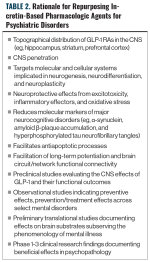Skidude
Illegitimi non carborundum
I am very curious as to how GLP-1s and other peptides commonly used can affect mental health.
In a quick search I was able to find some data via google, then I asked AI and received the following information.
What can you contribute to this thought project?
GLP-1s (glucagon-like peptide-1 agonists) are primarily used for managing blood sugar levels, particularly in type 2 diabetes, and are gaining attention for weight loss. There's some emerging research exploring their impact on mental health, although the evidence isn't fully conclusive yet.
Some studies suggest that GLP-1s may have a positive effect on mood and mental well-being. This could be due to their influence on appetite regulation and weight loss, which might contribute to improved self-esteem and reduced symptoms of depression and anxiety for some individuals. Additionally, GLP-1s may also have neuroprotective properties, possibly supporting brain health and cognitive function.
There have been studies exploring the neuroprotective effects of GLP-1 agonists, and some promising findings have emerged. GLP-1 receptors are present in several regions of the brain, and this has led researchers to investigate how GLP-1s could impact neurological function, including in the context of conditions like Alzheimer's disease and Parkinson's disease.
Here are some key points from the research:
OTHER DATA
 pmc.ncbi.nlm.nih.gov
pmc.ncbi.nlm.nih.gov
JAMA Psychiatry. Published online May 14, 2025 Glucagon-Like Peptide 1 Receptor Agonists and Mental Health A Systematic Review and Meta-Analysis
In a quick search I was able to find some data via google, then I asked AI and received the following information.
What can you contribute to this thought project?
GLP-1s (glucagon-like peptide-1 agonists) are primarily used for managing blood sugar levels, particularly in type 2 diabetes, and are gaining attention for weight loss. There's some emerging research exploring their impact on mental health, although the evidence isn't fully conclusive yet.
Some studies suggest that GLP-1s may have a positive effect on mood and mental well-being. This could be due to their influence on appetite regulation and weight loss, which might contribute to improved self-esteem and reduced symptoms of depression and anxiety for some individuals. Additionally, GLP-1s may also have neuroprotective properties, possibly supporting brain health and cognitive function.
There have been studies exploring the neuroprotective effects of GLP-1 agonists, and some promising findings have emerged. GLP-1 receptors are present in several regions of the brain, and this has led researchers to investigate how GLP-1s could impact neurological function, including in the context of conditions like Alzheimer's disease and Parkinson's disease.
Here are some key points from the research:
- Neuroprotection: GLP-1s are thought to have neuroprotective properties, potentially reducing oxidative stress and inflammation in the brain, which are factors linked to neurodegenerative diseases. Some animal studies have shown that GLP-1 agonists can promote brain cell survival and protect against neurodegeneration.
- Cognitive Function: Some clinical studies suggest that GLP-1s may improve cognitive function, especially in people with cognitive impairments related to diabetes. This is still a developing area of research, but there's evidence suggesting that GLP-1 might have a positive effect on learning and memory.
- Mood and Depression: There’s also growing interest in how GLP-1s could help with mood disorders like depression, especially in people with obesity and diabetes. The weight loss and improved blood sugar control associated with GLP-1s might indirectly improve mood. Additionally, some studies indicate that GLP-1s could have direct antidepressant-like effects.
- Parkinson's Disease: Some early-phase clinical trials and animal studies suggest that GLP-1 agonists may help slow the progression of Parkinson’s disease, potentially by protecting dopamine-producing neurons, which are affected in this condition.
OTHER DATA
Alleviation of Depression by Glucagon-Like Peptide 1 Through the Regulation of Neuroinflammation, Neurotransmitters, Neurogenesis, and Synaptic Function - PMC
Depression has emerged as a major cause of mortality globally. Many studies have reported risk factors and mechanisms associated with depression, but it is as yet unclear how these findings can be applied to the treatment and prevention of this ...
JAMA Psychiatry. Published online May 14, 2025 Glucagon-Like Peptide 1 Receptor Agonists and Mental Health A Systematic Review and Meta-Analysis


